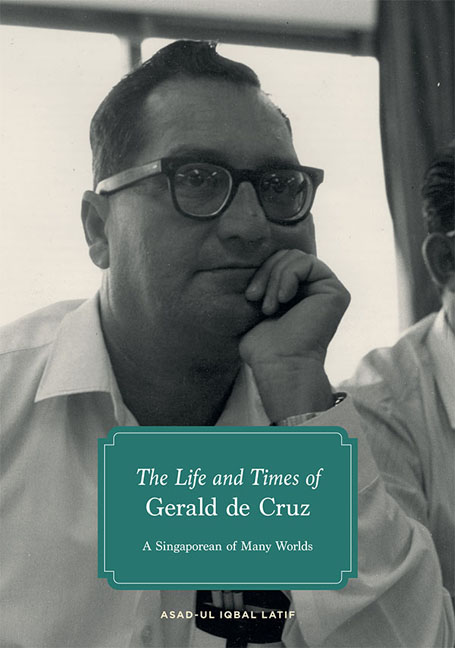Book contents
- Frontmatter
- Dedication
- Contents
- Preface
- Family Tree: Gerald Evelyn de Cruz
- 1 Don de Cruz de la Singapura
- 2 Childhood and Youth
- 3 The Japanese Occupation
- 4 The Communist Years
- 5 Going Abroad
- 6 The English Years
- 7 Return to Singapore
- 8 The Political Thinker
- 9 Friend of Labour
- 10 The Columnist
- 11 The Family Man
- Appendix
- Index
- About the Author
- Plate section
6 - The English Years
Published online by Cambridge University Press: 19 May 2017
- Frontmatter
- Dedication
- Contents
- Preface
- Family Tree: Gerald Evelyn de Cruz
- 1 Don de Cruz de la Singapura
- 2 Childhood and Youth
- 3 The Japanese Occupation
- 4 The Communist Years
- 5 Going Abroad
- 6 The English Years
- 7 Return to Singapore
- 8 The Political Thinker
- 9 Friend of Labour
- 10 The Columnist
- 11 The Family Man
- Appendix
- Index
- About the Author
- Plate section
Summary
On arrival in London, Gerald de Cruz began to look for a job. He rang up a British Army officer, a member of the Communist Party of Great Britain, who had made contact with him in Kuala Lumpur. Since he was a medical man, he asked de Cruz whether he would be interested in a job in the ancillary medical services. He got a job as an unqualified teacher in the Fountain Hospital for Mentally-Retarded Children in London. He also won a scholarship for a diploma in teaching such children.
The racism that greeted his presence at a course run at the National Association for Mental Health (NAMH) headquarters was unbelievable! His English colleagues resented the fact that he could speak and write English better than they could, although he was from a “backward” colony. Matters came to a head during lectures on child psychology given by a Hilda Clarke, the senior psychologist at the association. When she offered to test the Intelligence Quotient (IQ) of any volunteer from the students, almost all his colleagues shouted out de Cruz's name. If he fared badly, their prejudice would be vindicated; if he refused to take the test, he would be branded a coward. There was a burst of ironical cheering when he accepted the challenge. During the three hours during which he underwent the comprehensive Wechsler- Bellevue Diagnostic Tests, his fellow-students copied down the questions and answers. Among those who did not share their hostility was a twenty-eight-year-old Dane, Nils Christiansen, a fellow foreigner.
The test results were released two weeks later. De Cruz did quite well in motor and manual dexterity, scoring 120, the average score being 100 and the best possible 180 and above. In memory, vocabulary, calculation, general knowledge and so on, Clarke was unable to give him a score because he scored a perfect 100 per cent, which meant that she was not able to find the limits for his intelligence! “I don't know his intellectual potential”, she continued.
- Type
- Chapter
- Information
- The Life and Times of Gerald de CruzA Singaporean of Many Worlds, pp. 86 - 97Publisher: ISEAS–Yusof Ishak InstitutePrint publication year: 2015

